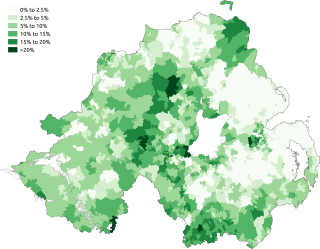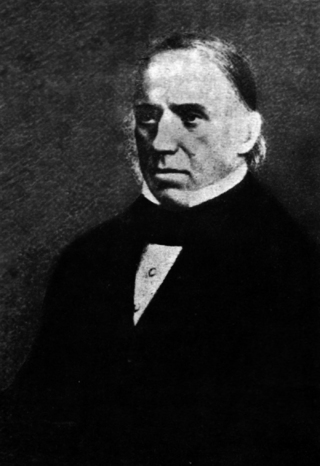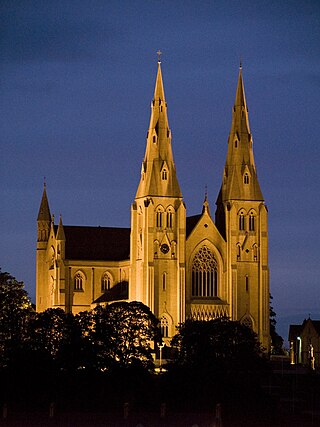Related Research Articles

The Irish language is, since 2022, an official language in Northern Ireland. The main dialect spoken there is Ulster Irish. Protection for the Irish language in Northern Ireland stems largely from the European Charter for Regional or Minority Languages.
The education system in Northern Ireland differs from elsewhere in the United Kingdom, but is similar to the Republic of Ireland in sharing in the development of the national school system and serving a similar society with a relatively rural population. A child's age on 1 July determines the point of entry into the relevant stage of education in the region, whereas the relevant date in England and Wales is 1 September.

Thomas Osborne Davis was an Irish writer; with Charles Gavan Duffy and John Blake Dillon, a founding editor of The Nation, the weekly organ of what came to be known as the Young Ireland movement. While embracing the common cause of a representative, national government for Ireland, Davis took issue with the nationalist leader Daniel O'Connell by arguing for the common ("mixed") education of Catholics and Protestants and by advocating for Irish as the national language.
Education in the Republic of Ireland is a primary, secondary and higher education. In recent years further education has grown immensely with 51% of working age adults having completed higher education by 2020. Growth in the economy since the 1960s has driven much of the change in the education system. For universities there are student service fees, which students are required to pay on registration, to cover examinations, insurance and registration costs.

The Gaelic revival was the late-nineteenth-century national revival of interest in the Irish language and Irish Gaelic culture. Irish had diminished as a spoken tongue, remaining the main daily language only in isolated rural areas, with English having become the dominant language in the majority of Ireland.

St Patrick's Pontifical University, Maynooth, is the "National Seminary for Ireland", and a pontifical university, located in the town of Maynooth, 24 km (15 mi) from Dublin, Ireland.

Eugene O'Curry was an Irish philologist and antiquary.
The Irish Church Missions (ICM) is a conservative and semi-autonomous Anglican mission. It was founded in 1849 as The Irish Church Missions to the Roman Catholics chiefly by English Anglicans though with the backing and support of Church of Ireland clergy and bishops, with the aim of converting the Roman Catholics of Ireland to Protestantism. The reference to Roman Catholics in the title was removed in 2001.

John MacHale was the Irish Roman Catholic Archbishop of Tuam, and Irish nationalist.

The Catholic Church in Ireland or Irish Catholic Church, is part of the worldwide Catholic Church in communion with the Holy See. With 3.7 million members, it is the largest Christian church in Ireland. In the Republic of Ireland's 2016 census, 78% of the population identified as Catholic; this was 6% lower than the 2011 figure. By contrast, 41% of people in Northern Ireland identified as Catholic at the 2011 census; it is expected that this proportion will increase in the coming years. The Archbishop of Armagh, as the Primate of All Ireland, has ceremonial precedence in the church. The church is administered on an all-Ireland basis. The Irish Catholic Bishops' Conference is a consultative body for ordinaries in Ireland.
The Irish Metropolitan Conservative Society was an Irish political movement based in Dublin which was linked to the Irish Conservative Party, the main political party in Ireland until 1859.

Hedge schools were small informal secret and illegal schools, particularly in 18th- and 19th-century Ireland, designed to secretly provide the rudiments of primary education to children of 'non-conforming' faiths. Under the penal laws of the time, only schools for those of the Anglican faith were allowed. Instead, Catholics and Presbyterians set up secret and illegal schools that met in private homes.
Events from the year 1818 in Ireland.
Souperism was a phenomenon of the Irish Great Famine. Protestant Bible societies set up schools in which starving children were fed, on the condition of receiving Protestant religious instruction at the same time. Its practitioners were reviled by the Catholic families who had to choose between Protestantism and starvation. People who converted for food were known as "soupers", "jumpers" and "cat breacs". In the words of their peers, they "took the soup". Although souperism did not occur frequently, the perception of it had a lasting effect on the popular memory of the Famine. It blemished the relief work by Protestants who gave aid without proselytising, and the rumour of souperism may have discouraged starving Catholics from attending soup kitchens for fear of betraying their faith.
Robert Daly was Church of Ireland Bishop of Cashel and Waterford from 1843 to 1872.

John O'Reily was an Australian Roman Catholic clergyman, the first Bishop of Port Augusta, and the second Archbishop of Adelaide. Born in Kilkenny, Ireland, O'Reily studied for the priesthood in Dublin. Upon his ordination in 1869, he migrated to Western Australia, serving as a parish priest in Fremantle, and founding a Catholic newspaper there. When the Diocese of Port Augusta was established in 1887, Pope Leo XIII named O'Reily as its first bishop. Concerned about the financial position of the diocese, he accepted the posting reluctantly. As bishop, he greatly improved the financial position of the new diocese, reducing its debt by half and earning a reputation as a competent administrator.
Owen Connellan was an Irish scholar who translated the Annals of the Four Masters into English in 1846.
Henry Joseph Monk Mason was an Irish writer who, although not a native speaker, specialised in Irish-language activities. He was a founder of The Irish Society, dedicated to spreading the Scripture in Irish, and a campaigner for prison reform.
The Reformed Priests Protection Society was a charity founded in 1844 to support former Roman Catholic priests who converted to the Church of Ireland. It was also known as the Priests' Protection Society for Ireland or the Reformed Romanist Priests' Protection Society. The Society had four objects:
- to "protect Priests of good character, who conscientiously abandon the Church of Rome for the pure faith of the Gospel" and to find positions for them in parishes or as missionaries
- to "afford protection and education" to men who abandon studying for the Roman Catholic priesthood "in consequence of the influence of divine truth"
- to promote "Scriptural and anti-popish instruction" through sermons and pamphlets
- to "reform Romish Priests" worldwide

Edward Newenham Hoare, a graduate of Trinity College, Dublin was an Irish Anglican priest: he was Archdeacon of Ardfert from 1836 to 1839, then Dean of Achonry from 1839 to 1850; and Dean of Waterford from then until his death.
References
- Blaney, Roger (1996). Presbyterians and the Irish Language.
- Curry, William (1835). The Picture of Dublin.
- Ó Mainín, M. (1973). "Achrann Creidimh in Iarthar Dhuibheach". In Mícheál Ó Ciosáin (ed.). Céad Bliain 1871-1971: Stair agus Seanchas Pharóiste An Fheirtéaraigh (in Irish).
- Ó hAilín, T. (1968). "The Irish Society and Tadhg Ó Coinnialláin". Studia Hibernica (8).
- Mason, Henry Joseph Monck (1835). Reasons and Activities and Facts Afforded by the History of the Irish Society Respecting the Duty of Employing the Irish Language, as a more General Medium for Conveying Scriptural Instruction to the Native Peasantry of Ireland. Dublin: M Goodwin and Co.
- Mason, Henry Joseph Monck (1844). History of the Origin and Progress of the Irish Society Established for Promoting the Education of the Native Irish through the Medium of Their Own Language. Dublin: Goodwin, Son and Nethercott Printers.
- McCoy, Gordon (2009). "History of Protestant Gaelic Speakers" (PDF). Archived from the original (PDF) on 28 September 2011.